Yemen has been heavily bombed for many years. The U.S. enabled the bombing of Yemen from 2015 until 2024, and it is now bombing Yemen directly. I will examine the history of these bombing campaigns and explain how they reflect a dysfunctional and delusional approach to the use of armed force in U.S. foreign policy. The bombing of Yemen can be divided into two phases: the campaign against the Houthi-led faction in the Yemen civil war and the U.S./Israel campaign resulting from the Gaza war. In neither phase has it been military effective.
Some Facts about Yemen
Yemen is not a tiny country. Although it is a relatively small player economically, it has a population of over 30 million and a land area between the size of California and Texas. The nation’s geography includes large areas of desert, but there are also extensive mountainous regions and a long coastline. Yemen is an ancient country, and the capital city of Sanaa, a World Heritage Site, has been continuously inhabited since the first century CE. Like Iraq, Yemen is a religiously divided tribal society, with Shia Houthis in the more populous northwest and Sunni tribes in the southeast. Tensions between these factions erupted into a civil war in 2014.
The Yemen Civil War is a complex conflict involving multiple parties. It started when Houthi rebels, a Shiite group from northern Yemen, seized the capital, Sanaa, and forced the internationally recognized government of President Abdrabbuh Mansur Hadi to flee. In 2015, a Saudi-led coalition, backed by the U.S. and other allies, intervened militarily to restore Hadi’s government. The war has also involved separatist movements, Islamist groups like Al-Qaeda, and regional rivalries between Saudi Arabia and Iran, which supports the Houthis. The conflict has led to one of the world’s worst humanitarian crises, with widespread famine, disease, and civilian casualties.
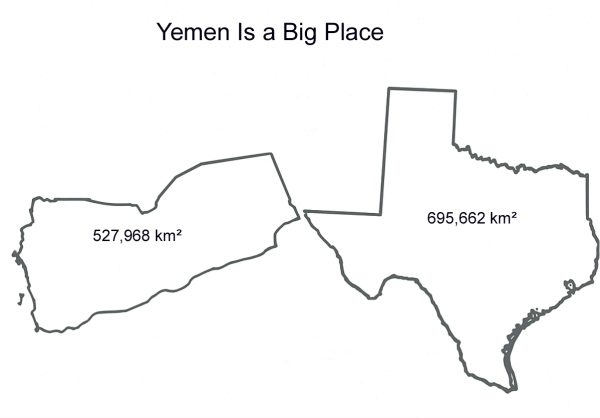
How the Bombing Started – The Yemen Civil War
The bombing of Yemen by the Saudi-led coalition began on March 26, 2015. The operation, called Operation Decisive Storm, was launched in response to the Houthi takeover of the capital, Sanaa, and their advance toward Aden, where President Abdrabbuh Mansur Hadi had fled after escaping house arrest in Sanaa.
The air campaign was initially intended to weaken the Houthis and restore Hadi’s government, but it escalated into a prolonged conflict, causing widespread destruction and a severe humanitarian crisis. The coalition, consisting of Saudi Arabia, the UAE, and other Arab states, received logistical and intelligence support from the U.S., U.K., and other Western allies. Despite years of bombings, the Houthis remain in control of northern Yemen, including Sanaa.
U.S. supplied bombs were used in vast numbers in thousands of Saudi alliance airstrikes, inflicting substantial casualties. Rough estimates based on the the number of strikes indicate that approximately 40,000 tons of bombs were dropped on Yemen by the Saudis and their UAE ally. Many of these were “precision munitions,” but they were often used with little concern for civilian casualties.
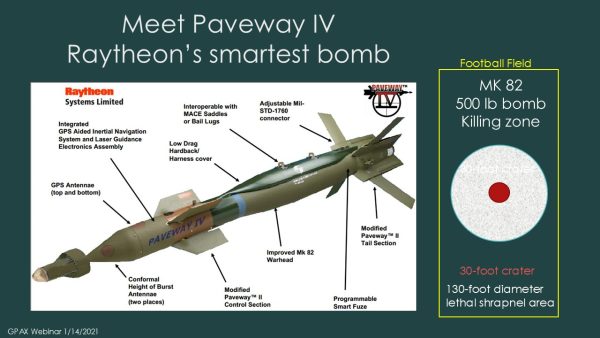
Death from Above
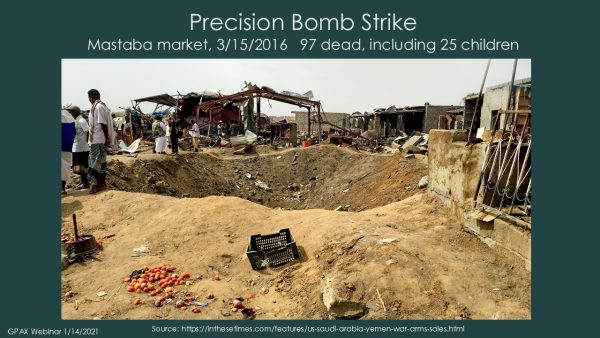
Precision strike?
How the Bombing is Going – U.S. Attempts to Break the Rea Sea Blockade
The U.S. had been making small and sporadic air strikes against Al Qaeda forces in Yemen, mostly with drones, since 2002. The tempo of these strikes increased until 2016, but the strikes were still pinpoint attacks, usually aimed a key individuals. Under the first Trump administration there were still more anti-terrorist strikes, with attendant civilian casualties. Under Biden, in 2021, these strikes declined, partly as a result of a cease-fire in the civil war.
With the outbreak of the Gaza, war, the Houthis declared a partial blockade of the Red Sea, prohibiting the passage of Israel related shipping. Israel launched several airstrikes against Yemen in an effort to break the blockade, and the U.S. committed naval forces to defend shipping against Houthi missile strikes. These efforts have been ineffective. There has been a significant reduction of shipping traffic because insurers are reluctant to provide coverage in the presence of war risks.
The blockade was suspended by the Houthis during the Gaza truce, but when hostilities resumed in March of this year, the Houthis announced their intention to resume the blockade. Trump then began a series of airstrikes against the Houthis and threatened to escalate the attacks further. Hundreds of strikes have been conducted by U.S. Navy and Air Force planes, with no end in sight. The Houthis have resumed their missile attacks and have continued to shoot down U.S. reconnaissance drones.
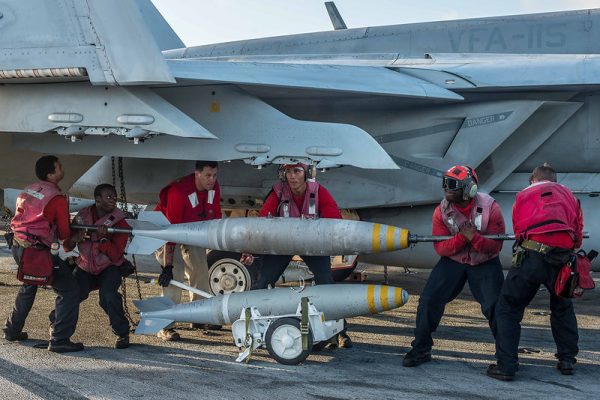
Cui bono?
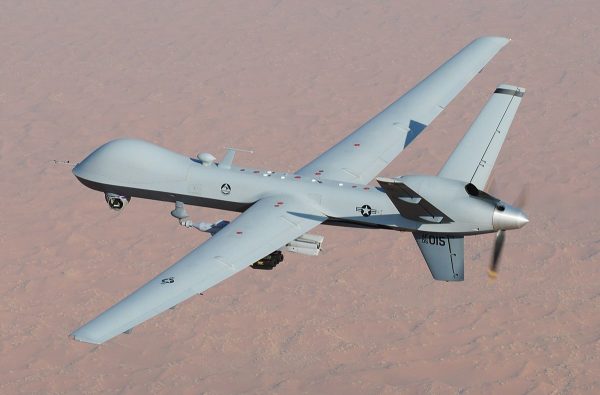
U.S. MQ-9 Reaper drone – 17 downed and counting
The Military Logic of Bombing
The delivery of bombs by aircraft developed for tactical and strategic purposes. The limited payload and numbers of early aircraft limited bombing to functioning as a kind of long-range artillery used to strike targets of tactical significance. After WWI, Germany pioneered a combined-arms approach that incorporated tactical bombing as a close support method for armored assault groups, enabling the blitzkrieg offensives of WWII. The mass production of long-range bomber aircraft in WWII enabled the rise of strategic bombing. Instead of directly assisting ground forces, the strategic bombers would deliver large-scale strikes intended to deprive the enemy of industrial war making resources.

J-87 Stuka – Blitzkrieg enabler
Military historians have judged tactical bombing to be a successful military innovation, and it remains the rationale for development and deployment of fighter/bomber aircraft worldwide. The combined-arms approach, in which air strikes are closely coordinated with ground operations, is standard military doctrine for conventional warfare. Opinions on the utility of strategic bombing are more critical. Postwar studies of the efficacy of strategic bombing have questioned the utility of air attacks in hindering enemy war-making potential and damaging public morale. Strategic bombing has seldom proven to be decisive in achieving a wartime victory. With the advent of nuclear ballistic missiles, the strategic role of manned bombers has been eclipsed, making the future of strategic bombing with conventional munitions doubtful.
Applying military logic to the U.S. bombing campaign In Yemen calls into question the purpose of this costly operation. Absent a ground campaign to neutralize Yemen’s missile sites, the bombing can only peck away at the hundreds of concealed and mobile missile launchers. A U.S. ground invasion and occupation would require around 200,000 troops and many years of fighting against insurgents, an unappealing reprise of the Afghanistan war. Strategic bombing of Yemen would require a vast U.S. Air Force and Navy effort and could entail the destruction of cities like Sanaa, a World Heritage site.

Ancient Sanaa – Strategic Target?
Punitive Expeditions and Performative Bombing
Throughout history, powerful nations have launched punitive expeditions against weaker states to assert their dominance and attain objectives by force. This characterized the gunboat diplomacy of the colonial era. The U.S. has used this tactic occasionally against tiny adversaries such as Grenada and Panama, but the practice has gradually become disconnected from geopolitical logic. It has morphed into a kind of performative display of power. To quote from a U.S. neocon foreign policy advisor:
Every ten years or so, the United States needs to pick up some small crappy little country and throw it against the wall, just to show the world we mean business.
— Michael Ledeen
A Profitable Theater of Cruelty
U.S. military operations are no longer grounded in the reasoning of geopolitics. Rather, they have become a kind of self-perpetuating spectacle that empowers politicians while enriching and enlarging the defense establishment. When Clausewitz famously stated that “War is merely the continuation of politics by other means,” he was referring to geopolitics, not domestic politics. While America’s wars since 2001 have not achieved any significant international political objectives, they have funneled trillions into the defense industry and advanced many military and political careers. The absence of any accountability for failure to deliver genuine accomplishments confirms this explanation. The continuing vast wasteful expenditures are not a bug; they are a feature. Thus, Trump’s bombing attacks and ferocious threats against Yemen and Iran are theatrical performances on a political stage that aid interests invested in permanent war.

Pete Hegseth, Secretary of War?
Conclusion
The pointless bombing of Yemen is a demonstration of a militarized U.S. foreign policy that has become detached from the political, geographic, and economic realities of the modern world. The U.S. cannot readily invade and occupy Yemen, and it is unlikely to end the Red Sea blockade by force. Performative bombing strikes aimed at arousing patriotic fervor in a war-loving U.S. electorate are inflicting gratuitous harm on thousands of Yemenis while increasing the probability of a wider Mideast War. Inflicting death and destruction on foreigners to no avail is not considered a problem in Washington; it is considered an accomplishment because it serves those who benefit materially and politically from foreign wars, and it feeds the appetite for violence of an ill-informed public.


Related to the US ‘civ’ please check out comments on hypothetical new American to the game of AOE2 (Age Of Empires 2). The tech bonuses and upgrades are hilarious (or sad).
https://www.reddit.com/r/aoe2/comments/1jm8v5u/continuing_with_my_brand_here_is_the_fourth_meme/
Having played a lot of AoE, this really is kinda funny. Definitely a gunpowder civilization. :)
Do you really think there is appetite for violence in US’ public?- Is there any polling supporting that? According to this 2023 survey (Americans Grow Less Enthusiastic about Active US Engagement Abroad) there is some of it indeed but it is getting less and less support lately.
Popular culture is the easiest gauge to read for judging the public’s appetite. War simulation games are wildly popular among young people (mostly male). Hollywood churns out an endless stream of violent films, many with military heroism themes. Mass media are filled with discussion of America’s “adversaries” and how we need to prepare to fight them. The American public is marinated in violence, and the gun death statistics confirm it.
Well, I agree that Hollywood films and US series in general have gone, let’s say, excessively baroque with violence to the point of nihilism. I really cannot stand most of those products though I don’t know if this is a real reflection of US appetites or if Hollywood et al believe these are the only appetites they want to serve or the only ones they are able to produce.
Did you see the pic above of Captain Crusader Hegseth with the M-16 tattoed on him? Deus Vult m-fers! Kill them all and let god sort it out!
I see bumper stickers on huge ‘murkan pick up trucks with images of the M-16, grenades and other. I saw a bumper sticker last week that said “God bless our troops abroad, especially the snipers”
Hollywood isn’t making movies for domestic audiences but products that can be quickly redubbed.
Re. Violent pop culture media. Respectfully disagree. (IMO) Your point *was* true in the past, but there has been a slow sea-change during the Global War on Terror (America’s warrior class tired of their kids being maimed in the sandbox) and Biden’s identify politics in government and the military pushed it over the edge.
Look at recent box office returns; the only successful “patriotic” movie has been the “Top Gun” sequel. And outside of the horror genre, “violence” rarely goes past the PG-13, trans-national sanitized violence of the comic book movies. IMO. YMMV.
Bottom line: even the formerly most gung-ho Americans have asked themselves, “War, what is it good for….?” And many have decided that they are not going to sweat, bleed, die for the decadent, bipartisan elites our Panem Capitol District.
https://www.boxofficemojo.com/year/?ref_=bo_nb_di_secondarytab
Here are the top grossing movie franchises of all time. Each one is a series of highly popular films.
– Marvel Cinematic Universe (MCU)
– Star Wars
– Harry Potter
– James Bond
– The Lord of the Rings/The Hobbit
– Fast and Furious
– Jurassic Park/World
– Pirates of the Caribbean
– Transformers
– The Hunger Games
With the possible exception of Harry Potter, they all feature lots of fighting and killing.
I think “all time” is doing a bit of work there.
War movies (or, more generally, glorifying the “good” going around the world to find monsters to violently destroy) generally sell and it’s not unique to US–most of these movies sold well in most countries. I guess I am skeptical that movies that proudly declare war is glorious sell well nowadays compated to even recent past. Off the top of my head, I think UP is right about the Top Gun sequel being about the only recent example. Even “war” movies can be very gray about the topic, besides.
True enough, but I do not see Hollywood making films like “Go Tell the Spartans” or “Paths of Glory” lately.
There are a lot of war movies made in countries with healthy cinema markets for domestic consumption that usually go unnoticed internationally as they don’t get distribution and rarely go for rewards. I’ve a list of Vietnamese movies made about the American war on my YT list that one day I’ll get around to watching. The Indian, Pakistani, Chinese, Japanese, Thai and French film industries regularly produce war films with a generally ‘patriotic’ themes that are often popular domestically but rarely get shown outside their countries (with the odd breakout exception like the recent Finnish film ‘Sisu’).
I can’t recall its name, but there is a small production company in England that regularly produces low budget WWII set ‘stiff upper lip’ type films that presumably sell well to Telegraph readers. I’ve a old dvd boxed set of Japanese films made about WWII lurking in a cupboard somewhere – not one of them got international distribution so far as I know, the exception being the ones where Godzilla appears. While none that I’ve seen are overtly pro-military, I suspect some of them would not go down too well with its neighbours.
That’s a good point. I looked up the corresponding list for my country (New Zealand) and there’s nothing like it. ‘Once Were Warriors’ at number four has plenty of violence but it’s not at all glorified (quite the opposite).
Three of the top ten were directed by Taika Waititi, who has also made movies in the US list you provided. He makes very different movies for the two countries.
The US movie business is deeply infiltrated by DoD, CIA, and Zionist interests, so what’s “popular” is more a reflection that we’re all basically living in a form of mass MKUltra mind control experimentation.
They’re just getting way less good at their jobs. Witness Wonder Woman versus Wonder Woman 1984. The first made bad IDF actress Gal Gadot into a star, the second made her into a laughingstock.
The Harry Potter series features lots of violence and killing. Have you ever watched it? The premise is that Harry’s parents have been murdered and he is subjected to unrelenting cruelty by his muggle relatives.
Harry is then engaged in a monumental life and death struggle with Voldemort, the Death Eaters, and the Dementors. Lots of blood-sucking and killing of major characters throughout the series. The whole thing is quite disturbing.
Many Americans are opposed to the endless wars concocted by their government. But it takes many years for them to actively oppose them and elect Representatives who share their disdain for all the senseless violence the US government perpetrates on the helpless.
I’ve been opposing endless wars since Vietnam (too young to understand/fight the Korean War)— to no avail. My current Rep. for my District is All In on the carnage in Ukraine and Gaza. He knows I don’t elect him, Aipac does!
Really? No one seems to give a fk that their public resources are being given away to fund genocide. I don’t see a major outcry about the threats against Iran, bombing “the Houthis” in Yemen, I don’t see any outcry about the starvation-siege warfare against Venezuela or Cuba etc. Ignorance is bliss I guess.
USians more peaceful? On the contrary, look at the anti-war movement 50 years ago, and then now. It should be clear.
If the US started bombing Iran today, the major networks would be in high gear and the majority of the US public would fall in line, happens every time. Meanwhile, the DoD budget increases, and the arms shipments to Israel continue
The glorification of violence (directly or indirectly) is notorious in the US
NFL, lol. I’m surprised there’s a debate.
Performative bombing accomplishes nothing. Vietnam, Afghanistan, Iraq, now Yemen and if the stupid overflows in the DC Bubble & Echo Chamber, bombing Iran will accomplish nothing and I suspect the retaliation will be exquisitely painful for Israel and for the United States. Unable and unwilling to close with the “other” guys, “our” guys kept throwing rocks.
These films make it sound like the US is the only savior of downtrodden governments and people and that military might produces heroes when it’s really the opposite. The playing of the national anthem at sports activities, the show of arms and uniformed military is all part of the propaganda.
Eh, I agree that the US public is largely in favor of levelling Yemen (and Iran for that matter). I disagree that pop culture is a solid indicator of sentiment. Chess and Go are both abstract war simulation games (Chess is self explanatory, and in Go the stones represent military units with the goal of capturing territory.). I’m a gamer and I love my war games (Age of Empires, Civilization, Warhammer, I could go on), but am not interested in actually waging war any more than your typical horror enjoyed is interested in doing murder.
TLDR: some of humanity’s oldest games are wargames, and plenty of non-interventionist nations enjoy war/action flicks and games.
Soeaking as a member of that public I don’t think Americans have the slightest clue about what Trump is threatening in the ME. In fact some of his voters in Arab areas of Michigan voted for him because he was supposed to stop the Gaza genocide. It’s worth remembering that Bush jr was only able to attack Iraq by pretending they had something to do with the twin towers.
So there’s a vast dishonesty about Trump’s posturing on this or, alternately, he is being led around by the nose by Waltz and others. But in his first term he was happy to bomb Yemen and nobody complained that he cares about and most especially not the Saudis who themselves tried to war against Yemen.
So it’s not just Waltz.
And thanks for the summer upper. The 30 million figure may explain why all previous attacks have failed. That’s too many for even Bibi to eliminate. Here’s another statistic: population of Iran is 92 million or ten times the Jewish population of Israel. The unreality of the entire situation is the notion that a tiny country like Israel can aspire to control a populous region like the ME through violence or perhaps proxy violence via those country’s own leaders. In any sane world a better choice would be for Israel to make peace. Somebody tell Trump.
The number of mass shootings in the US has continuously increased? Schools now have active school drills, something that only started becoming common after the Columbine High School shooting in 1999.
Well, war is a way to instill fear in the electorate, and fear politics has been the junk consumption pushed by the political PR groups that spend all the corporate cash to get their spineless talkers assigned to increase profit margins.
Fear politics sets up a straw man to be slain in order to get votes… the commies are comming, the hoards are storming the gates, police are brave, peace through strength, free markets are freedom. Department of war is now dept of defense (everyone likes defense better than war) . and on it goes
The MiCDict-ater.
Both parties got nothing to offer the people except the offer to be afraid.
So no progressive ideas make it to the vote because we can afford war but can’t afford peace … Raise cap on SS or even invert it and pay more for years of hard work?. Universal health care and no universal health insurance? you know, policies that government does to make living and working less expensive instead of policies that are making it harder to get by by the day….driven by fear and false straw men…like the government itself…. as Madison said “It is a universal truth that the loss of liberty at home is to be charged to the provisions against danger, real or pretended, from abroad.” -James Madison
And as seen over many years “War against a foreign country only happens when the moneyed classes think they are going to profit from it.” -George Orwell
So this fear politics is being used to entrench corporate power at a now hyper-accelerated rate, and making the excuse of national security and fear mongering to do it – the world is a stage. and fear the main character – lincoln had a couple of clear eyed statements when last the country was so in turmoil.
“We, the People, are the rightful masters of both the Congress and the Courts. Not to overthrow the Constitution, but to overthrow the men who have perverted it.” – Abraham Lincoln
“To sin by silence when they should protest makes cowards of men.” – Abraham Lincoln
Hunter S. Thompson
Congress says – let’s take the whole week off!
Src = Politico dot com
I know that I’m beating a dead horse, but none of these bombings are legal, and they are emblematic of an ongoing Constitutional crisis.
There is no AUMF that authorizes military force against Yemen or Ansar Allah. Congress is derelict in its duty to invoke the War Powers Act of 1973.
Even back in 2011-2012, Congress stopped military action against Syria. Where has Congress been for the past decade or so?
At the beach–this week anyway.
I think your question is a key reason why Trump thinks he can get away with all this.
Shorter Trump (quoting Adolf) “who remembers the Armenians?”
Of course Adolf’s rationale was for the thing we are supposed to “never forget.” We need a lot of remembering, stat.
And also of course Trump is perfectly capable of turning on a dime and pretending he was always a peaceful guy. Those who have already been dispatched may not hear him say it.
The article starts off well but slides into a confusion between Yemen and Ansar Allah. I don’t think the US believes it is attacking “Yemen:” certainly the Saudis and their allies didn’t. They were intervening in the civil war trying to prevent what they saw as an unfriendly regime backed by Iran coming to power on their borders. The hope, not realised, was that tactical airpower could turn the tide against the insurgents and bring Hadi’s government back to power in Sana’a. Other groups also have a lot of support, and as you say, it’s an intensely tribal society where groups form and disperse. Yemen also remains an uncomfortable junction of two countries with very different origins, and the southern part, the former Peoples’ Democratic Republic of Yemen (and the former British colony of Aden) was always much more politically and socially advanced than the North. That difference (which is unmistakeable if you talk to people there) is as important as tribal and religious differences. Hadi is from the South, Ansar Allah are from the North.
And the US? When all you have is a hammer, what else are you going to do? We’re in one of those situations where the only sensible option (stop military action) is politically impossible.
Why impossible? Don’t forget Trump once said Bush’s Iraq was was stupid and got booed for it. He’s now in power for four years (not more–that’s silly) and can do whatever he likes including telling the Israelis to make peace. He has all the agency in the world.
I remember long debates on C-SPAN on the Iraq War, and Ron Paul and others organizing Congress to reject military action in Syria during Obama’s presidency.
Now, we could invade Canada, and they’d do nothing. Too busy fundraising and insider trading.
We can debate the causes of such apathy (getting rid of the draft is a big one, IMO), but I don’t believe it is politically impossible to demand that we return to the situation that existed from the 1960s – 2012. Historically, Presidents find it irresistible to “flex” in foreign policy to escape domestic woes and jack up approval ratings. It’s up to the ‘mercan people to demand Congress restore its Constitutional role as having the power to authorize the use of force and declare war.
Honest question: What is the current state of the Yemeni Civil War? Is there any faction left strong to meaningfully contest the Ansar’s claim as the government of Yemen? I was under the impression that Ansar has basically won and is de facto government of Yemen, as much as PRC was the government of China by, say, 1960. If this is so, trying to distinguish between Ansar and Yemen would seem a bit quixotic.
The UAE-backed STC in Aden is still capable of posing a threat, apparently. Recently saw a story that the UAE and Saudi Arabia are trying to lobby for a “Normandy landing” of STC troops in Hodeidah.
With what army? Are they going to buy some Takfiri Uyghur mercenaries from Syria?
It really doesn’t take much to stop this senseless bombing business, witness the reaction of the Israeli air bases to the Turks putting one set of S 400 into the old T4 airbase in Syria. Changed their whole mindset overnight. They do this because they can do it without consequences, as soon as consequences loom they get their heads down.
Crowd funding on the internet for S 400/500 to Yemen is the way to go.
The “official” government that isn’t even physically located in Yemen but spend its time living in luxury on the dime of its GCC backers?
Ansarallah has the support and physical control of 80-90 percent of the Yemenese population. It is the government of Yemen no matter what westerners want to call the Saudi/UAE puppets.
Hi Houthi are not Shia. They are Sunni with Shia affinities
Not true. The Houthis are Zaydi Shi’a, unlike Iran and Hezbollah et al who are Twelver Shi’a. You’re thinking of Hamas and the PIJ, which are indeed Sunni.
Pity the USA no longer has a Battleship,immune to medium munitions.
It also has no munitions for one. Smart aiming on those 16 inch shells would really help a lot. But it will take decades for the MIC to make them in quantity.
This seems to be a faith based war: Megido etc?
What the bottom 80% of Americans want and need has not mattered for decades, what the top quintile wants and needs matters less every day.
Only the Donors truly count as the PMC is finding out.
Butter at $8.99 to $10.98 per Lb at the local store…
Too bad I can’t grow my own chickens.
I can and have made my own mayonnaise and mustard. I can grow my own potatoes and tomatoes even inside the apartment as I have plenty of windows and sunlight. I can even grow some of my spices like basil and mint.
Maybe if The Market™️ crashes I can find a tiny plot of land for the chickens.
I learned from this article that people routinely underestimate the amount of calories they need to survive. This may be why anorexia is the disease with the highest fatality rate of any mental illness. And as a corollary, why over the centuries, fatty foods have been the most highly prized and sought after. https://christophermccandless.info/possible-cause-of-chris-mccandless-death-sam-thayer/
Harold, thanks very much for this link – lots of valuable information.
It’s not that hard. Depending on soil condition, a McNugget can yield 3-5 chickens if watered and fertilized properly.
During the first rounds of bombings I was surprised to see own Oz deeply involved. On one news clip I saw one of our RAN ships teaching the Saudi navy how to conduct a blockade. Then the penny dropped. This was when there was a starvation blockade on the country so now I see my country helping the Saudis how to do it more effectively. But for a number of years one of our elite officers had a major role in the command structure of the coalition of fighting in Yemen. I think fighting for another country is illegal here but this case seemed to indicate that he was there on – unofficial – detachment-
https://www.abc.net.au/news/2016-02-08/yemen-civil-war-questions-role-australian-soldier-mike-hindmarsh/7141638
And it came out that our soldiers were helping conducting strikes on Yemen-
https://www.minister.defence.gov.au/media-releases/2024-02-29/increased-support-strike-action-against-houthi-rebels
We seem to up to our necks in fighting Yemen, not that the media here will really mention it much.
It really doesn’t matter whether the American people favor war or not. The MIC requires $50 billion in profits every year. Therefore we must not only sell weapons, we must use them up requiring replacement.
There is a sort of bureaucratic dysfunction that has taken hold over US war-fighting over the past century. The whole idea of “strategic” air campaigns was conjured up by early Air Force boosters like Billy Mitchell; they wanted a promotion, the easiest way to get a promotion is to head a new division, and so they lobbied to get a new division created. To justify a new, independent Air Force, they came up with some ad copy about how air power could win wars all on it’s own. Any half-serious military historian can see that it’s all bunk, just as the studies cited about WWII show in detail, but by 1947 the USAF gravy train was running at full steam, and no one wanted to stop it.
Ever since, whenever a US president feels a bit weak, we see big explosions on TV and big profits for the Defense industry, but nothing changes on the ground save the body count. Airstrikes are too easy, too flashy, for the politicians to resist. They don’t actually solve any political issue, but the issues are too complex and our leaders too idiotic to understand them anyway. It’ll be interesting if the Russians actually manage to “win” in Ukraine in some sort of humanely effective way how future historians will compare the Western and Russian approaches to war.
I’mWhat is the factual basis of this claim?:
As the situation was developing I remember commenters on dialogue works and Judge Nap saying that the Houthis threatened to start their bombing unless the next phase of the ceasefire was implemented but then the US started their bombing campaign preemptively to dissuade the houthis from resuming their bombing campaign.
I think the sequence of events matters and I would appreciate being corrected if my understanding is in error..
From the Reuters article https://www.reuters.com/world/middle-east/houthis-say-they-are-ready-escalate-after-us-strikes-yemen-2025-03-16/#:~:text=The%20Houthis%2C%20who%20have%20taken,t%20be%20nice%20about%20it!%22
as reported on March 17th, the day after the US initiated its first attack of the current series:
The timeline described in your article here
This article offers some more clarification:
https://www.reuters.com/world/middle-east/yemens-houthis-resume-attacks-israeli-ships-after-gaza-aid-deadline-ended-2025-03-12/
So the US attacks occurred after the Houthis announced they would resume attacks, but before they had actually renewed the launching of misiles, yes?
I apologize for the continuing of posting after moderation, I hope this doesn’t make me a hated person, but I just wanted to give you the benefit of my further research.
I checked the dates of the attacks and found that the Houthis announced their intention to resume the blockade on March 11. The strikes ordered by Trump began on March 15. The Houthis resumed missile attacks against U.S. warships and Israel starting on March 16. I have edited my Coffee Break post to reflect the sequence of events.